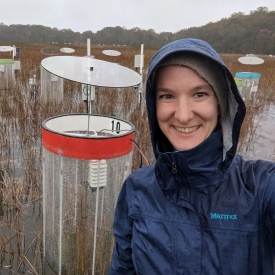The Global Change Ecology Lab combines biogeochemistry and microbial ecology to better understand how wetlands and other ecosystems respond to changing environments. In particular, we focus on the feedback between plants and microbes and how these interactions shape the dynamic, ecosystem-level responses to the factors affecting coastal ecosystems, including warming, elevated CO2, and sea level rise.
Many of our projects are focused on coastal wetlands. Along with the Biogeochemistry Lab, we manage SERC’s Global Change Research Wetland.
Current research themes include:
- Understanding how plant-microbe interactions control wetland carbon sequestration (SMARTX)
- Investigating how greenhouse gas dynamics respond to warming and sea-level rise (GENX and GENX-2)
- Improving coastal ecosystem representation in Earth Systems Models


The first summer of the Coastal Pulse Experiment (nicknamed GENX-2) just finished in August 2024. This experiment is led by Alia Al-Haj and designed to measure real-time emissions of CH4, CO2, and N2O in response to rapid/transient changes in temperature, inundation, salinity, and nutrient loading like you might get from a hurricane or heatwave. The automated flux chambers are all attached to a central "brain" designed by Roy Rich that sends signals to automatically close each lid in rotation, sample the air inside, and run it through two greenhouse gas analyzers. Over the course of the summer, we ran a series of experiments such as flooding the mesocosms with salt water for 3 days or heating up the soil by 5°C for a week and measured the greenhouse gas fluxes throughout. This lets us understand what sort of events are going to cause spikes in greenhouse gas emissions and the high-frequency flux measurements let us track how the ecosystem responds during the beginning, middle, and end of an event.
Turning a marsh into a climate change laboratory with heat lamps and CO2 pumps (April 28, 2025)
Wetland bacteria could make more methane in a warming world (April 23, 2025)
Hotter temps trigger wetlands to emit more methane as microbes struggle to keep up (April 23, 2025)
Hot Moments: Predicting the Unpredictable in Coastal Wetlands (September 25, 2024)
Meet the Scientist: Genevieve Noyce sees the future through marsh experiments (July 31, 2024)
World Wetland Day video (February 2, 2024)
A tale of oxygen priming in a wetland (April 18, 2023)
Why marshlands are the perfect lab for studying climate change (December 1, 2022)
Genevieve Noyce: Experimenting on the wetlands of 2100 (November 14, 2022)
Smithsonian scientists work to save Maryland's marshes and beyond (July 11, 2022)
What's the perfect temperature to bake your soil? (November 15, 2019)
Plants receive nitrogen boost in hotter climes (November 5, 2019)
Space-like chambers deliver the wetlands of a warmer world (June 3, 2018)
June 2024
The Global Change Ecology and Technology in Ecology labs were awarded a 5-year NSF grant! The project titled 'Spatial and temporal tradeoffs in CO2 and CH4 emissions in tropical wetlands' is led by Amy Zanne at the University of Miami and will focus on understanding the mechanisms driving spatial and temporal shifts in greenhouse gas emissions and carbon storage from Brazilian wetlands with different flooding regimes.
July 2023
The Global Change Ecology and Technology in Ecology labs were awarded a 3-year DOE grant! This project (GENX-2) titled 'Understanding and modelling current and future 'hot moments' in coastal wetlands' is led by Genevieve Noyce, along with SERC colleagues Roy Rich and Alia Al-Haj and DOE colleagues Teri O'Meara and Ben Sulman, and will focus on understanding the mechanisms controlling hot moments of CH4 and N2O emissions so that these processes can be incorporated into process-oriented biogeochemical models.
January 2021
The Global Change Ecology and Biogeochemistry labs were awarded a new NSF LTREB grant! This grant is led by Adam Langley at Villanova University and supports the long-term global change projects at GCReW.
July 2020
The Global Change Ecology and Technology in Ecology labs were awarded a 3-year DOE grant! This project (GENX) titled 'Understanding and modelling current and future coastal wetland methane emissions' is led by Genevieve Noyce, along with SERC colleagues Roy Rich and Teri O'Meara and DOE colleague Peter Thornton, and seeks to improve out mechanistic understanding of CH4 dynamics in response to environmental change and improve model representation of these dynamics.






